- Home
- Isabel Allende
The Sum of Our Days Page 2
The Sum of Our Days Read online
Page 2
“I can’t.”
“But you’re a lawyer, aren’t you.”
“I warned you the last time that I wouldn’t help you again. If you have chosen this life, you have to pay the consequences.”
Jennifer wiped away tears with her sleeve, but they kept running down her cheeks as she asked about her brother and her mother. Soon they said good-bye, and she was led out by the same uniformed woman who had taken my handbag. At that time she still had a shred of innocence, but six years later, when she escaped from the care of the Filipino doctor in the hospital, there was nothing left of the girl I had met in that prison. At twenty-six, she looked sixty.
When we left the jail it was raining and we ran, soaking wet, the two blocks to the parking garage where we had left the car. I asked Willie why he treated his daughter so coldly, why he didn’t place her in a rehabilitation program instead of leaving her behind bars.
“She’s safer there,” he replied.
“Can’t you do anything? She has to have some treatment!”
“It’s pointless, she has never wanted to accept help, and I can’t force her, she’s of age.”
“If she were my daughter I would move heaven and earth to save her.”
“She isn’t your daughter,” he told me with a kind of mute resentment.
At the time, a young Christian was hanging around Jennifer, one of those alcoholics redeemed by the message of Jesus, who have the same fervor for religion they once had devoted to the bottle. We saw him occasionally at the prison on visiting day, always with Bible in hand and wearing the beatific smile of God’s chosen. He greeted us with the compassion reserved for those who live in the darkness of error, a tone that drove Willie to frenzy but that had the desired effect on me: it made me feel guilty. It takes very little to make me feel guilty. Sometimes he took me aside to talk to me. While he was quoting the New Testament—“Jesus said to the sinning woman, Let he who is without sin cast the first stone”—I observed his bad teeth with fascination and tried to protect myself from his saliva spray. I have no idea how old he was, but when he wasn’t talking he seemed very young—maybe because of his freckles and the way he reminded me of a cricket—but that impression disappeared the minute he began preaching, all exorbitant gestures and strident voice. At first he tried to draw Jennifer into the ranks of the just by using the logic of his faith, but she was immune; then he opted for modest gifts, which had better results. For a handful of cigarettes she would tolerate for a while his reading passages from the Gospel.
When Jennifer got out of jail, he was waiting at the gate of the prison, dressed in a clean shirt and reeking of cologne. He often called us late at night to give us news of his protégée, and to threaten Willie, telling him he must repent of his sins and accept the Lord in his heart; then he could receive the baptism of the elect and rejoin his daughter in the shelter of divine love. He did not know whom he was dealing with: Willie is the son of a bizarre preacher; he grew up in a tent where his father, with a fat, tame snake rolled about his waist, imposed on believers his invented religion, which was why when he sniffed even a hint of a sermon, he split. The evangelical was obsessed with Jennifer, drawn to her like a moth to the flame. He was torn between his mystic fervor and his carnal passion, between saving the soul of this Mary Magdalene and taking his pleasure of her somewhat battered, but still exciting, body, something he confessed to us with such candor that we could not make fun of him. “I shall not fall into the delirium of concupiscence; no, I shall wed her,” he assured us with that strange vocabulary he had, and immediately treated us to a lecture on chastity in matrimony that left us speechless. “This guy is either a complete idiot or he’s gay,” was Willie’s comment, but he nevertheless clung to the idea of that marriage because that good-intentioned wretch might rescue his daughter. However, when her suitor, on his knees, set forth his plan to Jennifer, her response was a burst of laughter. That preacher was killed, brutally beaten to death, in a bar in the port, where he had gone one night to look for Jennifer and to spread the gentle message of Jesus among sailors and stevedores who were not in the humor to be led to Christ. We were never again awakened at midnight to listen to his messianic sermons.
Jennifer had spent her childhood hiding in corners, invisible, while her brother Lindsay, two years older than she, monopolized the attention of his parents, who could not control him. She was a mysterious and well-behaved little girl with a sense of humor too sophisticated for her years. She laughed at herself with clear, contagious giggles. No one suspected that she was climbing out a window at night until she was arrested in one of the most sordid neighborhoods in San Francisco many miles from her house, an area where the police are afraid to venture at night. She was fifteen. Her parents had been divorced for several years; both were occupied in their own affairs and perhaps had not gauged the gravity of Jennifer’s problem. Willie was hard-pressed to recognize the heavily made-up girl shivering in a cell in the police station, unable to stand up or speak a word. Hours later, safe in her bed and with her mind a little clearer, Jennifer promised her father that she was going to do better and would never do anything that foolish again. He believed her. All kids stumble and fall; he too had had problems with the law when he was a boy. That had been in Los Angeles, when he was thirteen, and his offenses were stealing ice cream and smoking marijuana with the Mexican kids in the barrio. At fourteen he had realized that if he didn’t straighten up right away he would be in trouble all his life, because he had no one who could help him, so he kept his distance from gangs and made up his mind to finish school, work his way through the university, and become a lawyer.
After Jennifer fled the hospital and the efforts of the Filipino doctor, she survived because she was very strong, despite her seeming fragility, and we heard nothing of her for a while. Then one winter day we heard a vague rumor that she was pregnant, but we rejected it as being impossible. She herself had told us she couldn’t have children, her body had suffered too much abuse. Three months later she came to Willie’s office to ask for money, something she rarely did since she preferred to make her own way—in that case she didn’t have to offer explanations. Her eyes darted around desperately, looking for something she couldn’t find; her hands were trembling but her voice was strong.
“I’m pregnant,” she announced.
“That can’t be!” Willie exclaimed.
“That’s what I thought, but look . . .” She unbuttoned the man’s shirt that covered her to the knees and showed him a protuberance the size of a grapefruit.
“It will be a girl and she will be born this summer. I will call her Sabrina. I’ve always liked that name.”
Every Life a Melodrama
I SPENT NEARLY ALL OF 1993 off to myself writing to you, Paula, crying and remembering, but I wasn’t able to avoid a long book tour through several American cities promoting The Infinite Plan, a novel inspired by Willie’s life. It had just been published in English though it had been written two years before and had already appeared in several European languages. I stole the title from Willie’s father, whose wandering religion was called the Infinite Plan. Willie had ordered the book as a gift for all his friends—by my calculations he had bought out the complete first printing. He was so proud that I had to remind him that it wasn’t his biography, it was fiction. “My life is a novel,” was his answer. Every life can be told as a novel; each of us is the protagonist of his own legend. At this moment, writing these pages, I have doubts. Did things really happen as I remember them and as I am telling them? Even with my mother’s invaluable correspondence, which preserves a daily, and more or less truthful, version of essential as well as trivial events, these pages are subjective. Willie told me that The Infinite Plan was a map of his course through life, and added that it was a shame that the actor Paul Newman was a little old to play the part of the protagonist, in case it was made into a film. “You must have noticed that Paul Newman looks like me,” he pointed out with his usual modesty. I hadn’t noticed, but I
didn’t know Willie when he was young, when surely they were as alike as two peas in a pod.
The publication of the book in English came at a bad time for me; I didn’t want to see anyone, and the idea of a book tour frightened me. I was still sick with grief, obsessed by what I might have done, but hadn’t, to save you. Why hadn’t I recognized the incompetence of the medical staff in that hospital in Madrid? Why hadn’t I immediately taken you out of there and brought you back home with me to California? Why? Why? I closed myself in the room where you lived your last days, but not even in that sacred place did I find peace. Many years would go by before you became a gentle, constant friend. In those days I felt your absence as a sharp pain that at times brought me to my knees.
I was also worried about Nico because we had just learned that he, too, had porphyria. “Paula didn’t die of the condition, but from medical negligence,” he insisted to calm me, but he was uneasy, not so much for himself as for his two children, and the third that was on the way; that ominous heritage might have been passed on to them, we would know that when the children were old enough to undergo the tests. Three months after your death, Celia announced that she was expecting another child, something I had already suspected because of the somnambulist’s purple circles beneath her eyes and because I had dreamed it, just as I had dreamed Alejandro and Andrea before they moved in their mother’s womb. Three little ones in five years was ill considered, given that she and Nico did not have steady jobs and also that their student visas were about to expire, but we celebrated nonetheless. “Don’t worry. Every child comes into the world with a loaf of bread under its arm,” was my mother’s comment when she heard. And so it was. That same week we started on the paperwork to obtain residency visas for Nico and his family, thanks to the fact that after five years of waiting I was finally an American citizen and could sponsor them.
Willie and I had met in 1987, three months before you met Ernesto. Someone told you that I had left your father for him, but I promise you, that wasn’t how it was. Your father and I were together twenty-nine years; we met when I was fifteen and he was soon to be twenty. When we decided to get a divorce I hadn’t the slightest suspicion that a few months later I would stumble upon Willie. We were brought together by literature. He had read my second novel and was curious to meet me when I sped like a comet across northern California. He was more than a little disappointed when he saw me because I am not at all the kind of woman he prefers, but he put up a good front and today he assures me that when he saw me he immediately felt a “spiritual connection.” I don’t know what that would be. As for me, I had to act fast, because I was leaping from city to city on a crazed tour. I called you to ask your advice and you answered, screaming with laughter, why on earth was I asking you if I’d already made the decision to throw myself headfirst into the adventure. I told Nico, and he exclaimed with horror: “At your age, Mamá!” I was forty-five, which to him seemed the threshold of the tomb. That was my clue that I had no time to waste, I had to get down to serious business. My urgency erased Willie’s justifiable caution. I won’t repeat here what you already know and I have told you many times. According to Willie I have fifty versions of how our love began . . . and all of them are true. In summary, I will say only that a few days later I abandoned my former life and, uninvited, turned up at the door of that man with whom I was so infatuated. Nico says that I “abandoned my children,” but you were studying in Virginia and he was already twenty-one years old, a fine young man who was past needing to be coddled by his mother. Once Willie had recovered from his shock at seeing me on his threshold, with my suitcase, we began our lives together with enthusiasm, despite the cultural differences that separated us and the problems of his children, whom neither he nor I knew how to deal with. It seemed to me that Willie’s life and family were like a bad comedy in which nothing went as it should. How many times did I call you to ask your council? I think every day. And you always gave me the same answer: “What is the most generous thing you can do in this case, Mamá?” Willie and I were married eight months later. And not at his initiative, but mine. When I realized that the passion of those first moments was turning into love, and that probably I would be staying in California, I decided to bring my children to the United States. If I wanted to be reunited with you and Nico I would have to be a citizen, so I had no choice but to swallow my pride and suggest the idea of marriage to Willie. His reaction was not the explosive joy I perhaps had dared hope for, rather more like terror; several failed love affairs had cooled the coals of romance in his heart, but in the end I twisted his arm. Well, in fact it wasn’t that difficult; I gave him until noon the next day to decide and began to pack my suitcase. Fifteen minutes before the time ran out, Willie agreed to marry me, although he never understood my stubborn insistence on living near Nico and you because in the United States children abandon their family home when they finish school and return only for a visit at Christmas or Thanksgiving. Americans are shocked by the Chilean custom of living as a clan all their lives.
“Don’t make me choose between my children and you!” I warned on that occasion.
“I wouldn’t think of it. But are you sure that they want to live near you?” he asked.
“A mother always has the right to gather her children around her.”
We were married by a man who had obtained his license through the mail by paying twenty-five dollars because though Willie was a lawyer, he couldn’t find any of his judge friends to do it. That made me apprehensive. It was the hottest day in the history of Marin County. The ceremony took place in an Italian restaurant that didn’t have air-conditioning; the cake melted down to nothing, the woman who was playing the harp fainted, and the guests, streaming sweat, started taking off their clothes. The men ended up without shirts or shoes and we women with no stockings or underwear. I didn’t know a soul except your brother and you, my mother, and my American editor, all of whom had come a great distance to be with me. I’ve always suspected that the marriage was not completely legal, and hope that some day we’ll have the enterprise to be married properly.
I don’t want to give the impression that I married for convenience alone, since I felt for Willie the heroic lust that tends to make women of my breed lose their heads—that’s how you felt about Ernesto—but at the age I was when we met, there was no need to marry were it not for the matter of the visas. In other circumstances we would have lived without the sanction of marriage, as Willie would doubtlessly have preferred, but I had no thought of renouncing my family, no matter how much my reluctant lover resembled Paul Newman. I had left Chile with you and Nico during the military dictatorship of the ’70s; together we had found refuge in Venezuela until the end of the ’80s; and with the two of you in the ’90s, I intended to become a United States immigrant. There was no question in my mind that your brother and you would be much better off with me in California than scattered across the world, but I had failed to take legal delays into account. Five years went by, which were like five centuries, and in the meantime you both had married, Nico to Celia in Venezuela, and you to Ernesto in Spain, but that didn’t seem a serious impediment to my plan. After some time went by, I had succeeded in installing Nico and his family two blocks from where we lived, and if death had not snatched you away long before your time, you, too, would have lived nearby.
I left on a book tour, crisscrossing the United States to promote my novel and give the readings and lectures that had been postponed the year before when I was unable to leave your side. Did you feel my presence, Paula? I’ve asked myself that many times. What were you dreaming that long night in 1992? I’m sure you dreamed because your eyes moved behind your eyelids and at times you awoke frightened. Being in a coma must be like being trapped in the dense fog of a nightmare. According to physicians, you weren’t aware of anything, but that was always hard for me to believe.
On the trip I carried a bag of pills for sleeping, pills for imagined pains, pills for drying my tears, and pills for my fear
of loneliness. Willie couldn’t go with me because he had to work; his office never closed, not even Sundays, and there was always an assortment of miscreants seeking miracles in his waiting room and a hundred cases on his desk. Just at that time, he was deeply involved with the tragedy of a Mexican immigrant who had died when he fell from the fifth floor of a building under construction in San Francisco. His name was Jovito Pacheco, and he was twenty-nine years old. Officially, he didn’t exist. The construction company had washed its hands of him, the man’s name was not on its payroll. The subcontractor had no insurance, and he, too, had “never seen” Pacheco. Actually, he had recruited him a few days before from his truck, along with twenty other illegals like him, and had driven him to the work site. Jovito Pacheco was a campesino and had never climbed a scaffold, but he had strong shoulders and a strong desire to work. No one told him that he should put on a safety harness. “I’ll sue half the world if I have to, but I’m going to get some compensation for that poor family!” I heard Willie say a thousand times. Apparently it wasn’t an easy case. He had a faded photograph of the Pacheco family in his office: father, mother, grandmother, three small children, and a babe in arms, all dressed in their Sunday finest and lined up in the bright sun of a dusty plaza in Mexico. The only one wearing shoes was Jovito Pacheco, a dark-skinned Indian with a proud smile and a straw hat in his hand.
On that tour I wore black from head to foot, using the pretext that black is an elegant color; I did not want to admit, even to myself, that I was wearing mourning. “You look like a Chilean widow,” Willie told me, and gave me a fire-truck-red scarf. I don’t remember what cities I went to, whom I met, or what I did; none of it mattered anyway, except for my meeting in New York with Ernesto. Your husband was very moved when I told him I was writing a memoir about you. We wept together, and the sum of our grief was unleashed in the form of a hailstorm. “It often hails in winter,” Nico commented when I told him over the phone.

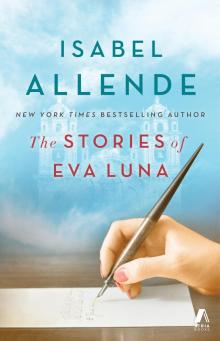 The Stories of Eva Luna
The Stories of Eva Luna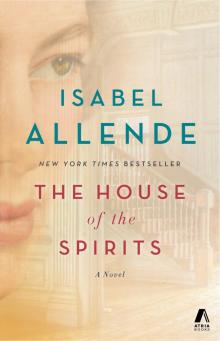 The House of the Spirits
The House of the Spirits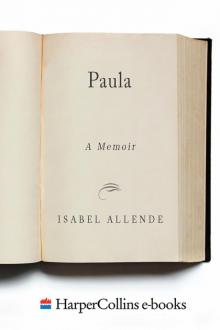 Paula
Paula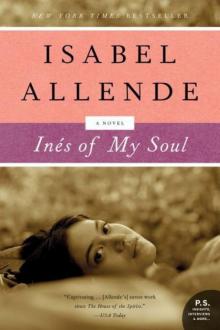 Ines of My Soul
Ines of My Soul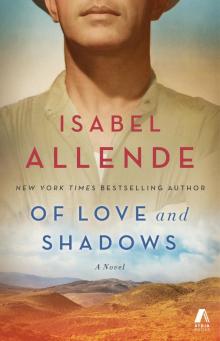 Of Love and Shadows
Of Love and Shadows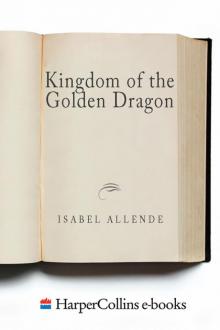 Kingdom of the Golden Dragon
Kingdom of the Golden Dragon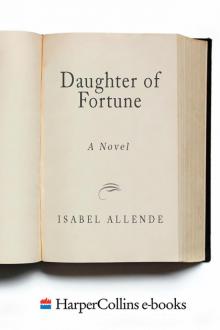 Daughter of Fortune
Daughter of Fortune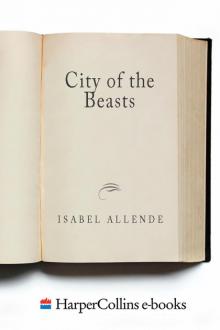 City of the Beasts
City of the Beasts Maya's Notebook
Maya's Notebook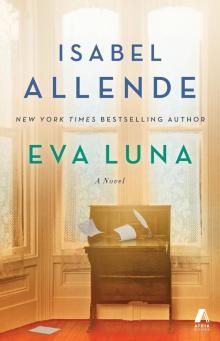 Eva Luna
Eva Luna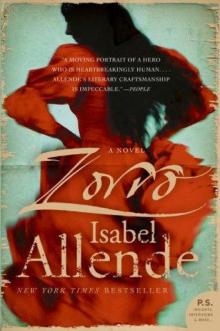 Zorro
Zorro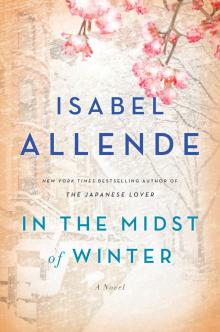 In the Midst of Winter
In the Midst of Winter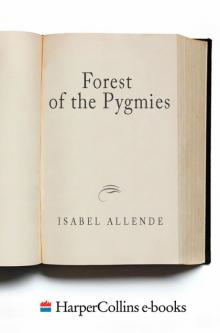 Forest of the Pygmies
Forest of the Pygmies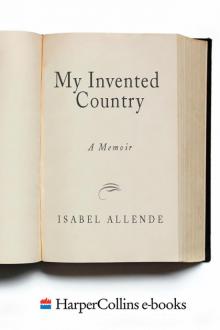 My Invented Country: A Nostalgic Journey Through Chile
My Invented Country: A Nostalgic Journey Through Chile The Japanese Lover
The Japanese Lover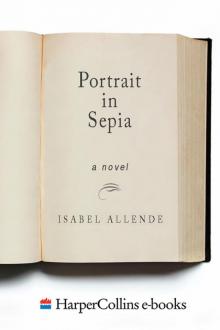 Portrait in Sepia
Portrait in Sepia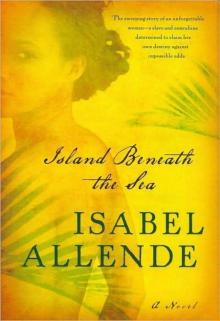 Island Beneath the Sea
Island Beneath the Sea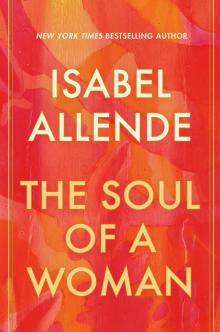 The Soul of a Woman
The Soul of a Woman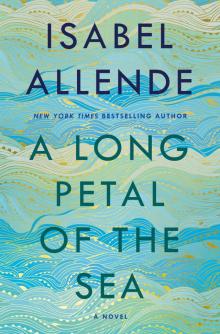 A Long Petal of the Sea
A Long Petal of the Sea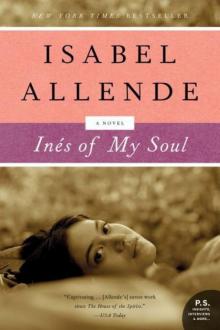 Ines of My Soul: A Novel
Ines of My Soul: A Novel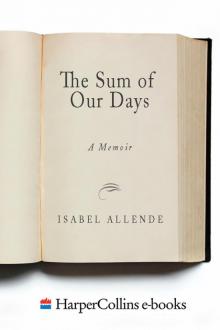 The Sum of Our Days
The Sum of Our Days